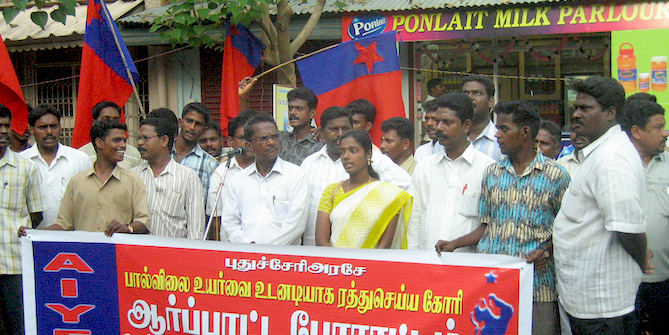Aparna Pande explains why India is unlikely to make concrete offers to Pakistan’s incoming government in an effort to improve bilateral ties. This is the second of three posts reflecting on democracy in South Asia and prospects for India-Pakistan bilateral relations in the run-up to Pakistan’s general elections on May 11.
A stable, civilian-led democratic Pakistan is in India’s vital interests. Every Indian prime minister from Jawaharlal Nehru to Manmohan Singh has recognised this. The sentiment is not just a catchall phrase for public consumption but also a fact believed by the majority of Indian policymakers, leaders and analysts. This group differs, however, in their thinking on when and how India’s western neighbour will become stable, civilian-led and truly democratic.
Good and stable neighbors make not only for good borders and security, but also boost economic growth and facilitate development. From the Indian perspective, a democratic and civilian-led Pakistan has multiple benefits. For one, talks between India and Pakistan have for too long been dependent on whether or not there is military or civilian rule in Pakistan as most Indian governments have been reluctant to deal with military rulers. Further, a civilian-led democratic government is accountable to its people and hence will need to spend more resources on economic growth and development, thus reducing its military spending as well as making it more transparent. Finally, such governments are also reluctant to favour a foreign or security policy that includes asymmetrical warfare and jihad.
In an ideal scenario, this is what should be expected of civilian democratic governments.
However, in the run-up to Pakistan’s 2013 general elections, Indian analysts are asking whether Pakistan’s establishment – the military-intelligence-technocratic-judicial establishment – will let whichever coalition government comes to power have genuine control over foreign and security policymaking.
As I point out in my book, “Explaining Pakistan’s Foreign Policy: Escaping India”, over the years Pakistan has evolved an ideology-driven national identity, which has had an impact on both its foreign policy and domestic politics. In the sphere of foreign policy, Pakistan has sought to escape what it perceives as ‘Hindu India’ while at the same time seeking parity with India. In the domestic arena, the ‘India factor’ has helped boost the power of the military-intelligence establishment and their national security narrative, which centres on their role in protecting Pakistan from the perceived existential threat from India.
More than half of Pakistan’s 66 years as an independent nation have been under military rule, and civilian set-ups have been an exercise in semi-democracy as the security establishment has retained controlling power. None of Pakistan’s military rulers believed in democracy and preferred managed rule, whether in the form of Ayub Khan’s Basic Democracy or General Pervez Musharraf’s doctrine of ‘enlightened moderation’.
Where an outright coup has not been feasible or desirable the establishment has preferred ruling from behind, as witnessed during the 1990s and also since 2008. What the last five years have demonstrated is that the military-intelligence- bureaucratic establishment now believes it is more beneficial to rule from behind the scenes and let the civilian government receive all the blame for poor governance. In addition, the two institutions that in most democracies play the role of watchdog over government seem to be overextending themselves: the Pakistani media is free, but there is tendency towards sensationalism, jingoism as well as reluctance to push back against the establishment and its narratives. The judiciary, meanwhile, has been described as ‘activist’ and seems as though it would like to take over the roles of both the executive and the legislature. Both these institutions also by and large accept the security establishment’s national security narratives and its views on India.
The outgoing coalition government led by the Pakistan Peoples Party (PPP), which came into power in March 2008, sought to make changes in Pakistan’s foreign policy, especially with respect to ties with India and the United States. While there was some movement on the issue of business and other visas and the granting of Most Favoured Nation (MFN) status to India, it has slowed. India’s MFN status is still pending, and the government faced push back on efforts to improve bilateral ties on both the foreign and domestic fronts.
At one level, there is a civilian consensus within Pakistan on India. All leading political parties in Pakistan – from the centre-left PPP, Awami National Party and Muttahida Qaumi Movement, to the centre-right parties like Pakistan Muslim League-Nawaz and Pakistan Tehrik-e-Insaaf – have said they seek better ties, especially in terms of trade, with India. And yet the worldview and India-centricity of the key actor, the security establishment, have not changed.
In order for there to be real, long-lasting change in India-Pakistan relations, not only do there need to be successive elections in Pakistan bringing civilian governments to power, but there also needs to be a concerted effort within the political sphere to push back against national security narratives and ideological nationalism that have been propagated over the years.
Until and unless a civilian government in Pakistan is able to win back its rightful place in all spheres of government decision-making, changes in policies towards India will be merely cosmetic. What this means, unfortunately, is that India and Indian leaders will remain reluctant to make concrete offers or have long-term discussions with any incoming Pakistani civilian government, particularly if they perceive that the government does not have the power to carry through on its promises.
Click here for a post examining the relationship between democracy and the rule of law in non-western contexts like India and Pakistan.
Aparna Pande is Research Fellow & Director of Hudson Institute’s Initiative on the Future of India and South Asia. Her book, “Explaining Pakistan’s Foreign Policy: Escaping India”, was published by Routledge in 2011.









1 Comments